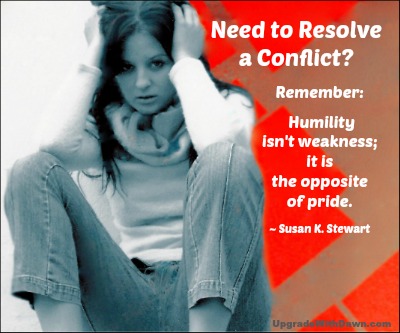A Fresh Take on Familiar Scripture
In this Biblical Thinking UPGRADE, Dawn Wilson shares a favorite scripture passage with a fresh "take" on the verses.
Have you ever become so accustomed to a Bible verse that you no longer appreciate it's impact?
Long-time Christians are familiar with Proverbs 3:5-6. We see it emblazoned on t-shirts and painted on  wall art. We're so used to seeing those verses, we don’t really take time to reflect on their richness.
wall art. We're so used to seeing those verses, we don’t really take time to reflect on their richness.
My dad wrote those verses in the front of my Bible when I went off to college. It was the only time I remember him sharing any scripture with me. When I joined a revival team two years later and became more aware of deeper spiritual truth, I added verses 7-8 to my understanding.
That passage remains with me after more than forty years, giving me direction and hope.
In these days when I’m dealing with a cancer diagnosis, I've returned for a "fresh take" on Proverbs 3:5-8. Here's what the Lord is teaching me.
1. My Sovereign God Is Trustworthy.
“Trust in the LORD with all your heart….” (verse 5a, NKJV).
Who is this One we’re to trust? He is the sovereign God who sees, knows and delights in us. He is faithful, trustworthy.
We can trust His love, wisdom, presence, power, provision and so much more—with all our heart. We’re not to be double-minded and unstable; we’re to rely confidently on the Lord.
Circumstances may cause us to struggle, but we’re not to live by our emotions. We’re to trust our faithful God and hold fast to His faithful Word (2 Timothy 2:13).
2. My Understanding Is Limited.
“And lean not on your own understanding” (verse 5b).
Humans have limited understanding, limited discernment. It’s not wise to depend on our own understanding or try to figure out everything on our own. In other words, don’t put your stock in your own understanding, insight, judgment, or strategies. Why?
God’s thoughts ways are higher and better—beyond us (Isaiah 55:8-9). There are things we may not know about our situation or why we suffer. That’s why we’re to seek the wisdom from above and the mind of Christ.
If we want a reputation for good judgment and common sense, we’ll want to saturate our mind and heart with scripture (Proverbs 4:5-15; Colossians 3:16; Philippians 4:8-9). We’ll store up His Word in our hearts (Psalm 119:11; Joshua 1:8) and walk in the Spirit, obedient to the Word (Galatians 5:16).
3. God’s Plan Is Always Best.
“In all your ways acknowledge Him…” (verse 6a).
Acknowledging God means submitting to Him. We know, recognize and then submit to God and His will. We listen for God’s voice and seek His will so we can submit to it.
Acknowledging Him also means we give Him the credit for everything we accomplish. We adore Him, lift Him up and magnify His name (Psalm 34:3). We make Him “bigger” in others’ lives through our testimony.
In everything, every day, we look for ways to acknowledge His work in our life. Our hope in God grows, and we praise Him more and more.
In acknowledging God knows best, we can be at peace.
We stop trying to control everything, knowing God’s counsel and plan are firm and for our good (Psalm 33:11).
4. God Can Keep Me on Track.
“And He shall direct your paths” (verse 6b).
In love, God wants to direct our path (Psalm 32:8). He wants to keep us on track. But we must pay attention to and submit to His will if we want His guidance (Proverbs 1:5).
God desires to make our way straight and smooth, establishing our steps (Proverbs 16:9), giving us light (Psalm 119:105), and keeping us from falling into destruction. Sometimes He removes obstacles that block our way (Psalm 37:23-24)—He can clear the road so we can faithfully follow Him. He will show us what path to take, and enable us to make wise, godly choices.
We experience God’s guidance as we pursue Him in His Word, but also as we are sensitive to the Holy Spirit (John 14:26; 16:13). We pray for God to teach us (Psalm 25:4-5). We learn to wait on His timing and are ready to take action at His command.
Our path might look different from others’ paths.
God knows the best path for us to please Him (and not be people-pleasers) so we can grow spiritually and love and serve others. As we put Him first, He will crown our efforts with success. He will reward faithfulness.
5. Human Wisdom Can Lead to Pride.
“Do not be wise in your own eyes” (verse 7a).
Pride stands in opposition to humility (Psalm 138:6; Matthew 23:12). Pride says (or acts like), “I know better than God.” The proud, conceited heart is impressed with its own knowledge and insights.
We can’t assume we know it all. As fallen, sinful creatures—with hearts deceived by sin (Jeremiah 17:9)—it’s foolish to think we can decide on our own what is right and what is wrong. (That’s why our culture is in trouble!)
As Christians, we must never operate independently of our Creator God or His Word.
God guides and instructs the humble and obedient (Psalm 25:9-10; 32:8). To be wise, become a life-long learner of the sure and reliable Word of God, not of the failing philosophies of the world. Ask God for His wisdom (James 1:5-8).
6. I Must Fear God and Turn from Evil.
“Fear the LORD and depart from evil” (verse 7b).
Wisdom comes from God, and the beginning of our wisdom is to fear the Lord (Proverbs 2:6; 9:10). Fearing the Lord involves living in reverent awe of Him and obeying Him.
As we fear God, we will begin to know His heart. We will love what He loves and hate what He hates. We will learn to shun evil and turn toward righteousness.
In other words, let’s run to God and run from evil!
7. Strength Comes When I Trust and Obey.
“It will be health to your flesh, and strength to your bones” (verse 8).
This has become the most exciting “fresh take” in my recent experience.
I cannot do much to change my medical prognosis except to follow the doctor’s orders, but I can do much to allow the Lord to change my heart as I trust Him and obey His direction.
Another translation of verse 8 says a healthy fear of the Lord will bring “health” to my body and “nourishment” to my bones.
This renewed health and vitality in my inner self will come when I am free from the strain of a sinful life.
I will feel stronger at my core as the Lord adds sweet blessing and refreshment to my life (Isaiah 40:31; 2 Corinthians 4:16).
There are many rich truths in this short section of scripture that can guide the Christian's life.
In summary:
- My sovereign God is trustworthy—I can confidently trust Him.
- My understanding is limited—I must seek wisdom from above.
- God’s plan is always best—I can safely surrender to His will.
- God can keep me on track—He’ll enable me to make wise choices.
- Human wisdom can lead to pride—Humility will help me depend on God’s wisdom.
- I must fear God and turn from evil—God wants to shows me His heart.
- Strength comes when I trust and obey—God can renew my health and vitality.
Can you see how these verses might apply in your own life circumstances? Where might you need a change of perspective?
Dawn Wilson, founder and President of Heart Choices Today, is a speaker and author,  and the creator the blog, Upgrade with Dawn. She is a contracted researcher/reviewer for Revive Our Hearts, and a writer at Christianity.com (wiki posts) and Crosswalk.com. She and her husband Bob live in Southern California and have two grown, married sons, three granddaughters and a rascally maltipoo, Roscoe.
and the creator the blog, Upgrade with Dawn. She is a contracted researcher/reviewer for Revive Our Hearts, and a writer at Christianity.com (wiki posts) and Crosswalk.com. She and her husband Bob live in Southern California and have two grown, married sons, three granddaughters and a rascally maltipoo, Roscoe.
Graphic adapted, courtesy of Bessi at Pixabay.
 Post a Comment → Posted on
Post a Comment → Posted on  Tuesday, July 23, 2019 at 8:52AM
Tuesday, July 23, 2019 at 8:52AM 






